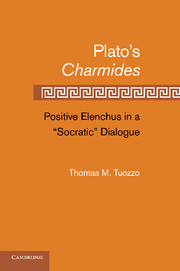Book contents
- Frontmatter
- Contents
- Acknowledgments
- Part One Approaching The Dialogue
- Part Two Approaching The Argument
- Part Three The Dialectical Investigation
- 5 σωϕροσύνη and Its Value
- 6 σωϕροσύνη as Self-Knowledge: Two Reformulations
- 7 Possibility of Self-Knowledge: Critian Formulation
- 8 Possibility of Self-Knowledge: Socratic Formulation
- 9 Return of the Value Question
- 10 Socrates??? Final Speech and Closing Scene
- 11 σωϕροσύνη, Knowledge, and the Good
- Works Cited
- General Index
- Index of Passages
5 - σωϕροσύνη and Its Value
Published online by Cambridge University Press: 05 February 2012
- Frontmatter
- Contents
- Acknowledgments
- Part One Approaching The Dialogue
- Part Two Approaching The Argument
- Part Three The Dialectical Investigation
- 5 σωϕροσύνη and Its Value
- 6 σωϕροσύνη as Self-Knowledge: Two Reformulations
- 7 Possibility of Self-Knowledge: Critian Formulation
- 8 Possibility of Self-Knowledge: Socratic Formulation
- 9 Return of the Value Question
- 10 Socrates??? Final Speech and Closing Scene
- 11 σωϕροσύνη, Knowledge, and the Good
- Works Cited
- General Index
- Index of Passages
Summary
Socrates’ dialectical examination of σωϕροσύνη with Charmides and Critias constitutes a single progressive investigation of the virtue. That investigation is given its direction by Socrates’ intent on leading his interlocutors to greater insight into σωϕροσύνη; the particular path it takes is determined in part by Socrates’ interlocutors, whose cognitive-moral states provide the starting points of the investigation. But the dialogue does not treat these cognitive-moral states as fixed, so that it would be Socrates’ goal simply to bring them forth to the light of day (and reveal their inadequacy). Rather, they are treated as subject to change, and it is precisely Socrates’ aim to bring about such change. When Socrates brings Charmides to a level beyond which he is not prepared to go, Critias takes over, and the discussion soon becomes quite abstract – a sign, not of Critias’ evasiveness, but of his intellectual sophistication. In the course of the discussion, considerable progress is made toward greater insight into σωϕροσύνη, and the path is indicated whereby the reader can get further in the quest for such insight.
Socrates starts then from Charmides’ current cognitive-moral condition. We get some insight into this both from the accounts of σωϕροσύνη he offers Socrates and from the byplay in the opening scene. As we have seen, immediately before the dialectical inquiry gets under way, Socrates asks Charmides whether he possesses σωϕροσύνη “sufficiently.” Charmides sees the potentially self-undermining nature of ascribing that virtue to oneself and avoids it as follows:
If, he said, I deny that I am σώϕρων, it will be odd (ἄτοπον) to say such things about oneself, and further I shall make Critias here out to be a liar, along with many others who think I am σώϕρων – as he tells it. But if, on the other hand, I say I am, and praise myself, perhaps it will appear offensive (ἐπαχθές). (158d1–5)
- Type
- Chapter
- Information
- Plato’s CharmidesPositive Elenchus in a 'Socratic' Dialogue, pp. 155 - 188Publisher: Cambridge University PressPrint publication year: 2011



